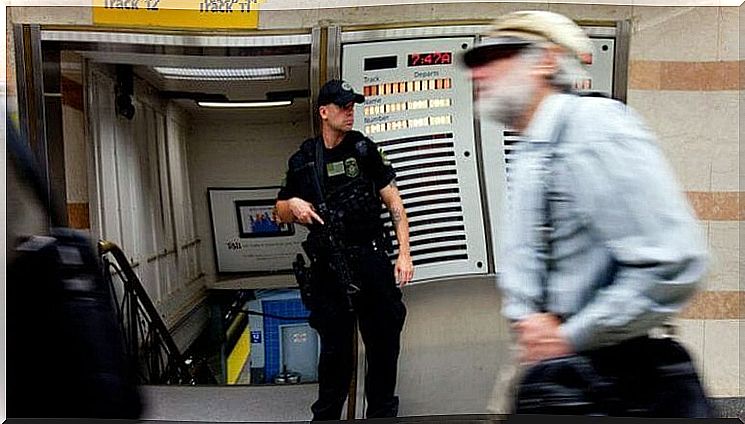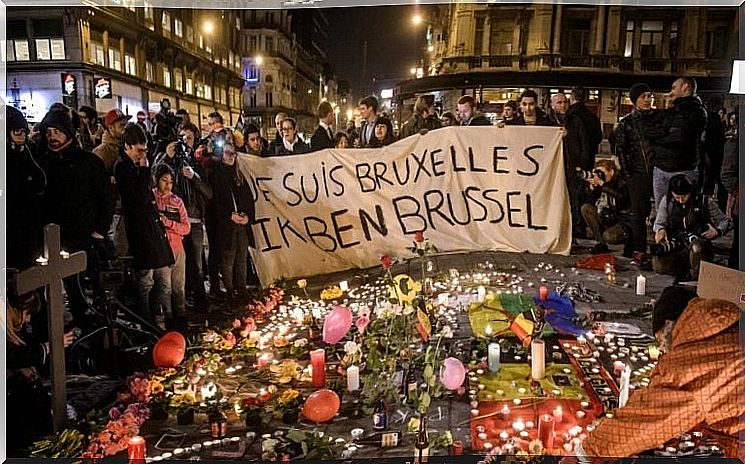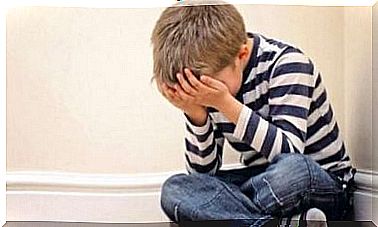The Shadow Of Terrorism Can Make Us Feel Helpless
There is a common saying that there is no greater loss of freedom than the uncertainty caused by fear. Terrorism and the recent attacks we have experienced do not only have a direct effect on the victims themselves. Because the emotional and psychological influence that comes with the shadow of terrorism and of fear has touched us all.
Terrorism has established itself in our society in flesh and blood. The victims we see on the news no longer live in the Middle East where, in the eyes of the Western world, suffering has sometimes “become normal in a selfish way.” Today, this fear of death is becoming more and more personal. That’s because these faces and lives sadly remind us of our own lives from afar.
Terrorism represents a growing and global threat that affects us all. It is also a threat that has its own effects. Examples of these effects are the noticeable lack of security and fear of attacks in the future. But there is also the unpredictability of these attacks and living in fear. Often it even causes a lack of trust in our institutions. New emotional and psychological demands impose themselves on us. We must learn how to deal with the shadow of terrorism.
We recommend that you think about this for a while.
Terrorism and its consequences
We often hear it said that the world will never be the same after September 11. So much so that many people in our societies have entered an accelerated crisis based almost exclusively on the shadow of fear. As a result of this fear, control measures have become stricter. Certain power structures were strengthened. Everyone keeps a very specific objective in mind during their approach and work: safety.
We must remember that security is actually the absence of fear. Moreover, this is also a right enshrined in the Charter of the United Nations. It clearly states that the physical and mental integrity of every person must be defended, secured and protected. If this doesn’t happen, we lose our sense of control. At the same time, our social and personal development is curtailed.

The effects of terror and helplessness, the shadow of terrorism
The International University of Valencia has conducted a study on this subject. According to this research, there are two phenomena that explain how terrorist acts can affect us and how the shadow of terrorism spreads:
- First, there is the ripple effect. This is a mechanism that causes multiple “expanding circles” after the attack or after the disaster. The first waves hit the victims themselves and their families. The second waves affect the community, the city or the entire area. Here the emotional influence is so high that it eventually leads to the development of a feeling of helplessness in the face of possible future attacks.
- Second, there is the contagion effect. This effect does not only come from contact with a direct victim of terrorism. But the media or other institutions create fear and increase the feeling of insecurity even more.
Almost without realizing it, this domino effect is created with the result that the shadow of terrorism expands. At first we are shocked by the attacks. Later, television channels, social networks, and the conversations we continue to have with other people bring that sense of helplessness to the fore. It even rises to the point where we limit our way of living or our behavior. We stop traveling and start to mistrust certain cultural groups.

We must not be prisoners of fear
An interesting article has appeared in the magazine “Psychology Today” . In the article, they state that terrorism will have triumphed in our societies once each of us exhibits the following four behaviors:
- Cancel our holidays and stop traveling
- Feeling fear every moment of the day and fearing an attack in our environment
- Developing mistrust of our institutions
- Feeling the need to move our families to safer places
Another article appeared in a social studies journal. In it, psychologist Ordoñez Dias tells us that the main objective of terrorist attacks is to create a psychological effect that produces a large social impact. In addition, they also try to exert a kind of power that is associated with fear and the feeling of insecurity.
Keep living a normal life

We may not have the means or the means at our fingertips to end this kind of disaster. The political intricacies and obscure motives that take place in the theater of geostrategy, politics, and armaments make us feel even more like puppets rather than protagonists.
But in order to confront the feeling of helplessness or deep fear, it is necessary that we avoid being prisoners of fear. Something as essential as allowing ourselves to live normal lives, interact with others, and respect each other can help us stay calm and balanced. Even praising the values that make people noble can help in this area.
To do this, we would like to close this article with a reflection. Remember the words of the philosopher Fernando Savater. “Intellectually, the most important thing is not that we understand the motives of terrorists, but our own motives so that we can resist them without using their weapons.”









